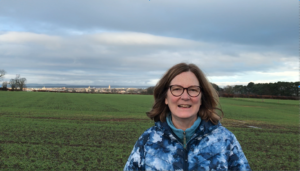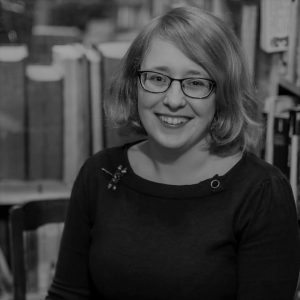Updates on activities
GOSSIP updates (26/11/21)
East Sands beach clean up
A team of 30 volunteers collected four full bin bags of rubbish from East Sands beach over two hours last weekend (Saturday 20 November). Students from the Museum Studies course, who organised the event, would like to say a huge thanks to everyone who attended.
The event, organised by the students in partnership with the Scottish Fisheries Museum, was a precursor to a joint exhibition scheduled for March 2022 and is linked to Nina Laurie’s AHRC work on “Fishing and Farming in the desert” based on climate change and El Niño in Peru. When it Rains, We Harvest: El Niño and Abundance in a Peruvian Fishing Community will explore how the desert communities of northern Peru have adapted to the impact of El Niño. Blending archaeological evidence from the Moche and Chimu cultures, modern-day objects from Peruvian fishing communities, and contemporary artwork by Scottish artist Frances Law, When it Rains, We Harvest is a timely study of community, heritage, climate change and fishing.
In support of the exhibition and its themes of community and climate change, the students decided to put on an event that would make a difference to the sea in the local area as well as unite the community around a common cause. The team – Aoife McKenna, Emily Sears, Mairi Campbell, Olivia Stuck, Jessica Hice, Kate Wilcox, Cora Alexander, Hannah Page, Shenxue Gu, Mary Tyrrell and Abigail Nairn – worked with other students, University staff and St Andrews residents to collect rubbish and enjoy some well-deserved hot chocolate.
Follow the exhibition team on Facebook or Instagram if you would like to find out more and to keep up to date with future events. Photos by: Mary Tyrrell, Shenxue Gu.
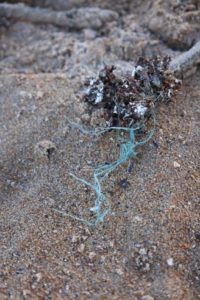
Global Regional Centre of Expertise in Education for Sustainable Development
Rehema White chaired the 12th Global Regional Centre of Expertise in Education for Sustainable Development 16-18th November. It was a virtual event, with input from all round the world. There were practice sharing and workshop sessions, keynotes and award ceremonies, and the event was commended for its interactive processes and imaginative use of film, music and poetry with an online ceilidh and quiz to bring people to Scotland as much as possible online. You can see resources and inputs here. Rehema gave the launch talk on 18th November to the exhibition In Time at the Wilhelmina Barns-Graham Trust by Harbour, where three artists – Gillian Macfarland, Annie Cattrell and Leila Galloway – are exhibiting innovative new work. Some of it is inspired by glaciers and it aligns with COP26. You can browse here and even book a visit and go if you are in Edinburgh.
Accelerating progress towards the UN SDGs: knowledge into practice
The Scottish Universities Insight Institute held a conference on “Accelerating progress towards the UN SDGs: knowledge into practice” with recent programme teams and Rehema White gave a keynote on behalf of Scotland’s SDG Network and spoke on behalf of the programme on sustainable land use that she co-led. You can see posters from programmes and illustrated animation of the event on this padlet.
African perspectives on green innovation (19/11/21)
On Saturday, 13th November, Ife Okafor-Yarwood was an invited discussant at the African panel on ‘African perspectives on green innovation’ chaired by the Jesuit Justice and Ecology Network Africa at the Yale Global Justice Conference. Ife blued the discussion by presenting on ‘legal but unsustainable, the impact of the European Union Sustainable Fisheries Partnership Agreement in West Africa’. She first discussed how current efforts to mitigate the impact of climate change through green technology further undermines livelihoods and sustainable use of resources in Africa. Ife also published a paper in Marine Policy titled ‘Survival of the Richest, not the Fittest: How attempts to improve governance impact African small-scale marine fisheries’. The article is now trending at number 4 in Political Science (16th-17th November).
SGSD Political Ecology Network Node (24/09/21)
A Political Ecology Network (POLLEN) Node has formed within the School of Geography and Sustainable Development. This week, Nina Laurie, Antje Brown, Jess Hope, Jo Mhairi Hale, Luis Andueza, Michael Simpson, Charlotte Lee, Alejandra Pizarro Choy, Rehema White, Louise Reid, Cornelia Helmcke and David Humphrey (Social Anthropology) have joined the global network of researchers, activists, groups and projects that study, teach, and practice political ecology.
The aim of POLLEN is to facilitate interaction and creativity through “cross-fertilisation” of information and ideas within the field of political ecology, and to serve as a platform “where the world’s many rich, diverse traditions can come together, discuss, and debate the latest developments in the field”. One of its principles is to find “strength in diversity, acknowledging that it is the interaction between many and varied traditions of theorization on social-environmental relations that continues to make this field so vibrant.”
The SGSD-Node follows these footsteps to create an open space of dialogue and debate between people fascinated by or curious about political ecology approaches and who wish to share their ideas, literature, events, or funding opportunities. Being part of POLLEN allows a greater exchange of experiences, insights, opportunities and advances in the field, as well as to communicate own interests, findings or publications across institutions and borders via the monthly newsletter, the POLLEN Blog or the biannual conferences.
GOSSIP updates (03/09/21)
Favela, Resistance and the Struggle for Food Sovereignty
The Portuguese version of a new, collectively written book by Antonis Vradis, Timo Bartholl, Christos Filippidis and the amazing Minhocas Urbanas (Urban Worms) collective, with a foreword by Raj Patel (U Texas at Austin), is now in pre-order. Published by the Rio de Janeiro-based Consequência Editora, Favela, Resistance and the Struggle for Food Sovereignty is the culmination of the British Academy-funded Nutricities grant, on which Antonis has been PI. A Greek version of the book will soon be published by the Athens-based Futura Books, with an English version to then follow by PM Press in Oakland, CA.
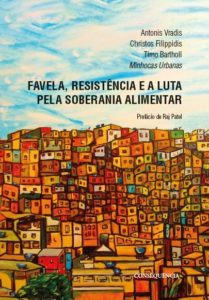
University’s emerging ‘decolonising’ agenda
Dan Clayton was an invitee (last Friday) to the University Museum’s ‘Re-collecting Empire’ workshop, which explored ‘colonial presences and legacies’ in the University’s collections. This is one of a number of initiatives associated with the University’s emerging ‘decolonising’ agenda. Dan presented a paper on ‘Fish hook with fibre twine’ (from the University’s Ethnological Collection), which got him into the death of Captain Cook, The X Files, and the decolonial politics of Pacific museums, &tc. The workshop was led by Dr Claire Robinson (University Curator) and Dr Emma Bond (Mod Langs.) and will culminate in a book.
RGS-IBG Annual Conference 2021
Nina Laurie has been in-person all week at the RGS-IBG conference in London- 1 of the 120 people there, along with a record 2500 folk online!
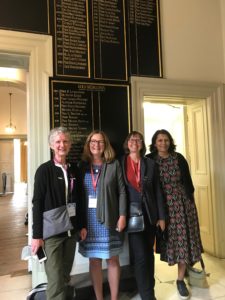
Vivian So, Nissa Finney, David McCollum and Hill Kulu presented at the RGS-IBG Annual Conference on ‘Residential mobility in the UK during the coronavirus pandemic’. This work, from their current Centre for Population Change (CPC) project, shows an increase in moving house during the pandemic particularly for those in London, students, and those motivated by family reasons. The paper raises the question of who is able, and who is not, to move house to improve their circumstances, and the role of housing policies in addressing these inequalities.
Nissa Finney and David McCollum took part in a round table discussion at the RGS-IBG Annual Conference reflecting on the practices, contributions and future of the Population Geography Research Group (PopGRG). The discussion drew on the ‘PopGRG Archiving Project’ that Nissa and David, and other members of the PopGRG Committee, are part of. Nissa and David also attended the PopGRG AGM, welcoming new committee members and a programme of events for the coming months that includes the PopGRG 50th Anniversary Festival to celebrate 50 years of the Research Group, the oldest of the RGS-IBG Research Groups (see popgeog.org).
The RGS-IBG Population Geography Research Group Committee, which Nissa Finney and David McCollum are members of, announced the winner of the ‘Images of Population Geography’ competition that has been run in partnership with a School of Sanctuary in Swansea. The winner, chosen by two professional artists, is David (Year 2), whose illustration can be seen here. Keep an eye on the website and @pgrg_rgsibg for more joyful images coming soon!
UNODC West Africa field trip update
Ife Okafor-Yarwood is currently away on a field trip to West Africa for UNODC. Ife left Côte d’Ivoire for the Benin Republic two weeks ago. In Benin, she met with different stakeholders, including the Chief of Naval Staff. She learned first-hand about the gendered nature of maritime threats in the country and the impacts and steps to address them. She feels humbled to meet with the fisherfolk who experience the effects she reads and teaches about – climate change, overexploitation, marine development, all of which exacerbate their vulnerabilities. Unfortunately, these vulnerabilities expose these people to threats as they become hopeless prey in the hands of an organised criminal network. Ife was interviewed for a Vice documentary published on 21st August 2021. Over 1.3 million people have watched it on YouTube – Pirates are Running Wild off West Africa’s Coast – YouTube. She feels privileged that the opportunity to contribute to ventures such as this, which can lead to real change on the ground.
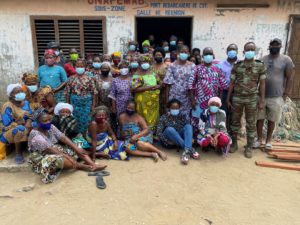
Nina is a Fellow! (08/04/21)
Professor Nina Laurie is one of five University of St Andrews academics to be elected to this year’s cohort of the Royal Society of Edinburgh Fellows. The Royal Society of Edinburgh (RSE) was established by Royal Charter in 1783 by key proponents of the Scottish Enlightenment, its Fellows are drawn from a wide range of disciplines. The work of the RSE includes awarding research funding, leading on major inquiries, informing public policy, and delivering events across Scotland to inspire knowledge and learning. Nina joins around 1600 leading thinkers and practitioners from Scotland and beyond, whose work has a significant impact on our nation.
Sustainable land use in Scotland (02/04/21)
Rehema White contributed to three online workshops on sustainable land use in Scotland last week. On Monday, she was a respondent in the SEDA land use conversation on nature and wellbeing. On Tuesday, she facilitated a gathering on “Making Falkland a Better Place”. On Thursday, she chaired the first formal workshop of the Scottish Universities Insight Institute Place, work, folk Programme Workshop “Sustainable land use and governance in Scotland: addressing the global UN SDGs, national imperatives and local needs”. This is a partnership with Universities of Dundee and Aberdeen and with Land Commission and Falkland Estate. A film, poem, art installation and further workshops will continue this work.
Evidence for Equality National Survey (19/02/21)
Nissa Finney presented at the Launch of the Evidence for Equality National Survey (EVENS), which will document the lives of ethnic and religious minorities in Britain during the pandemic. Other members of the research team also presented alongside project partners and supporters (Muslim Council of Britain, Operation Black Vote, GateHerts Roma Gypsy Traveller, Royal Society for Literature). The EVENS launch was covered widely by local media (press and radio), national media including BBC online, Daily Mail, The Times, The Herald, and Nissa appeared on STV evening news with a nice plug for the University of St Andrews! Part of the innovation of the survey is a ‘bottom up’ approach to recruitment. If you have networks of people who might like to participate please direct them to bit.ly/evensurvey or promote the survey via social media @EVENSurvey #EVENSurvey.
Climate change, COP26 and the crucible of crisis (19/02/21)
This week saw the publication of a special issue of the Scottish Geographical Journal which Dan Clayton and Charles Warren have been working on as editors for over a year. Focused on the forthcoming COP26 climate conference in Glasgow, and entitled ‘Climate change, COP26 and the crucible of crisis’, it comprises 19 contributions from an eclectic mix of academics, activists, policy-makers and community voices from around the world, providing stimulatingly diverse perspectives on our common challenge. The contents list includes a paper by Doug Benn and one by Lea Weimann, an undergraduate in our School, co-authored with the University’s Sustainability Officer.
You can find the issue here.
Improving maritime security in the Gulf of Guinea (19/02/21)
On Wednesday 17th February, Ife Okafor-Yarwood presented at a conference organised by the North Atlantic Treaty Organization (NATO) Southern Hub on the Gulf of Guinea; improving Maritime Security; how can we improve coordination on education, training and running exercises in the region? The speakers included two Ambassadors of the African Union and representatives of regional navies and maritime organisations in West and Central Africa. She highlighted the need for research to be placed at the core of maritime interventions and extending education and training to relevant stakeholders, especially coastal residents, with indigenous knowledge of the sea. As always, she found it very humbling to contribute to steps taken by international partners and the regional government to stem the tides of insecurity.
Covid-19 and ethnic inequality (12/02/21)
Nissa Finney and colleagues from the Centre on the Dynamics of Ethnicity (CoDE) have been successful in their ESRC funding application for ‘Covid-19 and ethnic inequality’. The award is for £2.2 million, for 18 months from April 2021. Nissa will lead a project on housing and welfare (with colleagues from Universities of Manchester and Edinburgh) and will co-lead a workstream on ‘mapping the crisis’ using data from the 2021/22 Census and the new CoDE Covid-19 survey of ethnic and religious minorities that she is currently leading.
Gulf of Guinea piracy: a symptom, not a cause, of insecurity (12/02/21)
Ife Okafor-Yarwood reports that in light of the increasing incidents of piracy and armed robbery at sea in the Gulf of Guinea and calls by the international shipping sector and countries like Denmark for the Gulf of Aden styled response – NATO /military presence in the region, she was invited by the Institute of Security Studies in South Africa to co-author an op-ed illuminating why that is an elitist and unsustainable approach. Read the article here.
El Niño- a phenomenon with opportunities: learning history and valuing community assets for an empowering digital curriculum in northern Peru (11/02/21)
Nina Laurie (Geography and Sustainable Development) and Karen Brown (Art History), together with their partner, the Peruvian NGO PRISMA, have been awarded £150,000 from AHRG GCRF for their proposal “El Niño a phenomenon with opportunities: learning history and valuing community assets for an empowering digital curriculum in northern Peru”. This proposal expands the reach and enhances the impact of a prize-winning online educational innovation in environmental storytelling about the El Niño Phenomenon. This initiative was piloted in June 2019 as part of participatory qualitative data collection for the SFC GCRF and AHRC project “Fishing and Farming in the Desert? Understanding El Niño Foods System Opportunities in the Context of Climate Change in Sechura, Peru”, and in response to COVID-19 restrictions on face-to-face, in-person teaching in Peru. Ongoing research is exploring how livelihoods in poor communities have historically taken advantage of El Niño rains and temporary lagoons that form in the Sechura desert. To widen impact and engage a broader public, new partnerships led by PRISMA with the local museum and heritage sector will take the project’s participatory practices and outcomes beyond school platforms and link students’ storytelling with museum artefacts’ digitisation. These will be curated for public outdoor learning and become focal points for intergenerational sharing and exposition. Through a strategic partnership with the Royal Geographical Society, curriculum development will also target an international audience, generating a bilingual interactive web resource on El Niño, animated by storytelling and digital imagery produced by Sechura students and targeted at secondary and primary students in Peru and the UK.
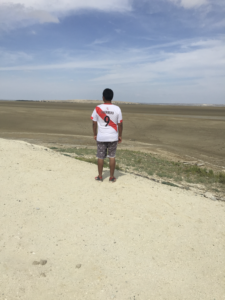
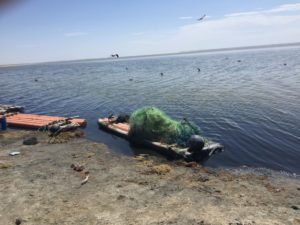
Driving development in the Amazon: Extending infrastructural citizenship with political ecology in Bolivia (09/02/21)
Jess Hope has a new paper out in Environment and Planning entitled Driving development in the Amazon: Extending infrastructural citizenship with political ecology in Bolivia. The abstract is below and you can access the full paper here.
In this paper, I extend the analytical framework of infrastructural citizenship with political ecology and reorientate analysis to rural geographies, extractive infrastructure and indigenous territorial movements. Drawing from recent fieldwork in Bolivia, I argue that an extended conceptual framework of ‘infrastructural ecological citizenship’ better acknowledges the multiple, changing and contested ways that people and rural places co-exist and how these relationships are being reworked as infrastructure and citizenship are co-constituted. I use this framework to analyse a conflict over road building in an indigenous territory and national park in lowland Bolivia – the Isiboro Sécure Indigenous Territory and National Park (Territorio Indígena y Parque Nacional Isiboro Sécure; TIPNIS), revealing how the road building project weakened the pre-existing political and material infrastructures that underpinned modes of indigenous territorial citizenship within Bolivia’s Plurinational State, as well as foregrounding how transnational extractive capital has shaped negotiations of territorial place-based citizenship in the TIPNIS. In doing so, I contribute to debates on infrastructural citizenship, resource extraction and sustainable development, revealing the ongoing potency of place-based claims on land and related claims for territorial citizenship.
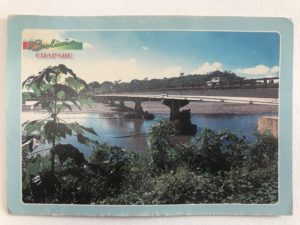
Education for sustainable development (05/02/21)
Rehema White has chaired a number of international and national events around education for sustainable development (ESD) recently; plenty of activity and new thinking in this area. On 4th February, Learning for Sustainability Scotland hosted a Global RCE (UNU Regional Centres of Expertise in ESD) webinar Achieving the SDGs: Action through Learning along with the Global RCE Centre (mainly based in Japan). The keynote was from UNESCO and nearly 200 participants represented RCE Bogota, RCE Nairobi, RCE Kyrgyzstan, RCE London, RCE Portland USA and many more! This is part of a series of events building to the Global RCE Conference that we are hosting along with COP26.
On 12th January Rehema chaired the first online annual gathering of Learning for Sustainability Scotland on ‘Building Forward Better – the role of LfS’. Recordings and all the presentations are available here. The keynote address was from Arjen Wals, Professor of Transformative Learning for Socio-Ecological Sustainability at Wageningen University.
Rehema chaired a meeting of the EAUC Topic Support Network / LfS Scotland Task Group on 15th January to collate inputs from Scotland to the consultation on the QAA guidance on ESD that we discussed in the School recently. She then participated in QAA’s UK Expert Committee meeting on 29th January. Over 100 inputs were made to the consultation, with many useful suggestions, but not suggesting a total overhaul, so we will revise the guidance and hope to launch it in March.
Peruvian National Education Development Fund’s Annual Innovation Competition Winners (18/12/20)
Congratulations to Instituto Educacional Daniel Alcides Carrión (IE DAC), a secondary school in Sechura Peru and collaborator on SGSD’s Nina Laurie, Tania Mendo and Dan Clayton’s Fishing and Farming in the Desert AHRC and SFC GCRF funded research. This week IE DAC were one of 84 winners in the Peruvian National Education Development Fund’s (FONDEP) annual Innovation competition. 1332 projects were submitted from across Peru and judged by a national panel of experts. IE DAC’s winning project – ‘RECUST’ (Recopilar, crear y utilizar storytelling [collect, create and use storytelling]) – was an innovative response to conducting research under COVID restrictions. Intergenerational oral histories were originally planned to be carried out in person by St Andrews staff working with IE DAC. In March 2020, lockdown and the suspension of classes in Peru left the 154 schools and 21,059 students in the UGEL (the Sechura School Board), abandoned with no educational support. The digital divide particularly affected non-metropolitan schools. Schools in the Sechura desert had no means to engage online, further adding to the challenge of ensuring “inclusive and equitable quality education” for all (SDG4). In response, the St Andrews Farming and Fishing research project provided computer tablets and data packages for local partner NGO PRISMA to deliver an online curriculum around environmental storytelling for the students and staff at IE DAC – from there RECUST was born. Felicitaciones!
Feminist geopolitics and the global-intimacies of pandemic times, or, why Covid is a feminist issue (27/11/20)
Jo Sharp gave the plenary at the New Zealand Geographical Society annual conference on Thursday night (Friday morning for them). She was supposed to be there in-person but instead gave her talk virtually, the title of which was: Feminist geopolitics and the global-intimacies of pandemic times, or, Why Covid is a feminist issue. Jo would like to extend her thanks to Mike Simpson for reading through her talk and providing really useful feedback.
Covid 19 St Andrews-Bonn Social Sciences Roundtable (20/11/20)
Ife Okafor-Yarwood participated in the Covid 19 St Andrews-Bonn Social Sciences Roundtable, which took place this Tuesday. Participants shared some of the innovative Covid-related research taking place at Bonn and St Andrews. Ife discussed her recently funded SARRF research idea on “gendered implications of fisheries crime and COVID19 on livelihoods in West Africa”.
The roundtable also sets the groundwork for potential future collaboration. For those interested in exploring collaboration further, there is a funding opportunity here.
SDG Network Scotland (20/11/20)
Rehema White has been elected onto the new Steering Group of SDG Network Scotland. She has managed to include critical debate on the SDGs in the Network’s objectives! The website says “This coalition of more than 600 people and organisations has elected its first steering group, who will now oversee and facilitate collaborative action towards the UN Sustainable Development Goals (SDGs) in Scotland. Made up of a broad mix of figures from the voluntary and private sectors, academia, and other leading bodies, the group will build on the success of last summer’s SDGs progress review as it looks to support Scotland’s efforts to be a world leader in sustainable development.”
Ecovillage Transition in Action (20/11/20)
Rehema White, within the project on Ecovillage Transition in Action, co-presented webinars firstly as part of the European Day of Communities and secondly in the Global Ecovillage Network Annual European Gathering. Drawing audiences across Europe and beyond, these events helped to exchange knowledge with people in communities and local authorities who are scaling up sustainability across regions.
Fife Sustainable Natural and Cultural Coastal Zone (20/11/20)
David McCollum, Nina Laurie, Tim Stojanovic, Rehema White and Ife Okafor-Yarwood have all be awarded funding as part of Richard Bate’s new SARIRF interdisciplinary project: “The Fife Sustainable Natural and Cultural Coastal Zone – a blueprint for the sustainability of communities & the protection of natural & cultural heritage”. Exciting to see this new initiative in our local area and another string link with Earth Sciences emerging.
Sustainable Futures in Africa network: pandemic responses (10/11/20)
Jo Sharp and colleagues have just launched a new project website at the ESRC Festival of Social Sciences. This website aims to host a variety of responses to the COVID-19 pandemic from the perspective of the communities of the Sustainable Futures in Africa network. The launch event was filmed and can be seen on the website.
Alternative Explanations: Disability Research in the Global South (10/11/20)
Sarah Huque presented findings from her PhD research at the ‘Alternative Explanations – Disability Research in the Global South’ webinar, organised by the Disability and Inclusion Africa Network project. The webinar featured the work of 18 postgraduate researchers and offered an opportunity for wider discussion with an audience of disability researchers, scholars and activists.
Adaptive rowing in Scotland (10/11/20)
Nina Laurie shares the news that, in association with St Andrews Coastal Rowing Club, the Rowing the Waves Research has helped to produce a series of short films to encourage the take up of adaptive rowing in Scotland. These films, which include a very moving interview with former SGSD colleague Emilia Ferraro were funded by the University’s Knowledge Exchange and Impact Fund. They can be viewed here.
Return Migration in the context of COVID 19 (30/10/20)
Nina Laurie and Anthropology colleague Ana Guttierez participated with Peruvian colleagues from the NGO CIPCA in the launch of their report (10 pm to midnight UK time!) on Return Migration in the context of COVID 19 based on ‘Rapid Response’ Research conducted in June in northern Peru funded by the Scottish Funding Council (SFC)’s Global Challenges Research Fund (GCRF). The report will be available in English and Spanish on the Centre for Amerindian and Latin American Studies. Thanks are owed to 4th year honours Geography student Iona Bell who helped translate the report from Spanish. See the University press release.
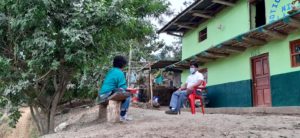
Impacts of COVID on fisheries dependent communities (30/10/20)
Tania Mendo is happy to report that she and Nina have been successful in obtaining UKRI-COVID funding (~£300K) to understand the impacts of COVID on fisheries dependent communities and to develop strategies to reactivate the seafood supply chain whilst minimising further COVID infections in Peru. The project brings together scientists from SGSD, Biology and Research Computing at St Andrews with the Food and Agriculture Organisation (FAO, Rome), the Commonwealth Scientific and Industrial Research Organisation – Oceans and Atmosphere (CSIRO, Australia), the Agrarian University La Molina and the NGO REDES (Peru).
Two funding successes in collaboration with Medicine (30/10/20)
Mike Kesby and Katy Keenan are happy to report two funding successes in their collaboration with Medicine. They will be Co-Is on a new 18-month NIHR-funded project ‘CARE’ (total grant £917K) . The grant starts in November 2020 and extend the work of the HATUA consortium to explore how COVID-19 is affecting antibiotic use and AMR in Uganda and Tanzania. Along with colleagues in Medicine, they have also been awarded £200K funding from the SFC GRCF to develop the St Andrews Africa Research (STAAR) network, which will consolidate existing research links between St Andrews and institutions in East Africa through research on TB and AMR, capacity building and knowledge exchange.
Implications of fisheries crime on coastal communities: examples from Nigeria and the Gulf of Guinea (23/10/20)
Ife Okafor-Yarwood is happy to report that this Thursday she gave a talk at the Blue Justice webinar series organised by the Norwegian government and the United Nations Development Programme, on “implications of fisheries crime on coastal communities: examples from Nigeria and the Gulf of Guinea”. Among other things, Ife highlighted the need for further research to understand the gendered implications of fisheries crime. She also touched on the cyclical nature of the impact of fisheries crime. Primarily, the exposure of coastal communities to drugs use, and the potential for this to lead to an increase in HIV and Hep C transmission among people who inject drugs (PWIDs) in those communities. She always finds it humbling speaking to the global community about her work because she feels that they have a role in stemming the tides of security threats at sea in the Gulf of Guinea.
St Andrews/SFC Global Challenges Research Fund 2020-21 (09/10/20)
Tim Stojanovic and Althea Davies working with a team from the School of Computer Science have won funding for a project entitled “Pro-conservation Livelihoods and Community Capabilities for Marine Protected Area Governance”
The project will partner with NGOs and communities in Kenya, Ghana and Madagascar involved in the governance of marine protected areas. In Kenya the project will build on work done in 2019-20 and explore options for carbon credits for mangrove and seagrass protection; eco-certification for coral reef tour boats; and alternative livelihoods for marginalised communities.
Peace and security strategy for Africa (02/10/20)
Following Ife Okafor-Yarwood’s presentation at the Obangame Exercise Senior Leadership Symposium organised by the US Naval War College on the 15th of September, The Director, Office of Regional Peace and Security, US Bureau of African Affairs reached out to ask for a meeting to provide strategic advice on how her recommendations at the symposium can be integrated into their peace and security strategy for Africa, in relation to maritime governance and security. Ife had a fruitful one-hour meeting with her, her deputy director and five other team members this Wednesday. Ife reports it feels so gratifying to engage with policy makers through her work and through these engagements she hopes for a better outcome for the coastal communities whose plight she bring to the fore. Ife would like to extend a special shout out to Profs Jo Sharp and Nina Laurie for providing useful advice on how to navigate the space.
GOSSIP updates (25/09/20)
Office for National Statistics (ONS) Ethnic Group Assurance Panel
Nissa Finney has been appointed to the Office for National Statistics (ONS) Ethnic Group Assurance Panel. The Panel will provide support and guidance for the ONS in their work on ethnicity (and related) data collection and analysis. This includes Census analysis plans, Census quality assurance, the National Statistician’s inclusive data taskforce and a review of how cultural statistics are collected.
Exploring Racial and Ethnic Inequality in a time of Crisis
Nissa Finney (Co-I) and colleagues in the Centre on Dynamics of Ethnicity (PI Bridget Byrne, Manchester www.ethnicity.ac.uk) have been awarded funding from the ESRC for the project ‘Exploring Racial and Ethnic Inequality in a time of Crisis’. The total award is £2.46 million. Nissa will primarily be involved in leading the design and implementation of a new survey of ethnic minority populations in Britain. The survey will be methodologically and substantively innovative, providing novel data – comprehensively for ethnic minority populations – to enable understandings of differential experiences of austerity and Covid-19.
Tuberculosis in the time of COVID-19: improving Safety in Healthcare Facilities
Mike Kesby and Katy Keenan have had further grant success through their collaboration with the School of Medicine – this time in a one-year, £77,300 GCRF project lead by Dr Derek Sloan – titled: Tuberculosis in the time of COVID-19: improving Safety in Healthcare Facilities. Collaborating with colleagues in Medicine and in Uganda, Katy and Mike will help design the social science component of the project which will explore how healthcare workers and patients are reacting to the COVID-19 crisis in terms of their health-seeking behaviour and attendance at health care facilities. Data from the project will be used to create public health messaging tools to maintain effective care for a range of diseases and reduce stigma around care-seeking.
COVID-19 as a catalyst to shift the power in partnerships
Jo Sharp was involved in a virtual presentation with the Sustainable Development in Africa network yesterday: COVID-19 as a catalyst to shift the power in partnerships, International Development Alliance, Scotland, Digital Summit: global development beyond COVID-19, 24th September 2020.
Ecovillage transition webinar for European Day of Sustainable Communities (23/09/20)
The Ecovillage Transition in Action project involving Rehema White, Jo Hale, Sofia Mardero and our recently departed Paula Duffy did a webinar this week as part of the launch of Communities for Future (CfF) and the European Day for Sustainable Communities (EDSC) 2020. There is a series of associated events ongoing this week. See the picture below of visual art on the webinar.
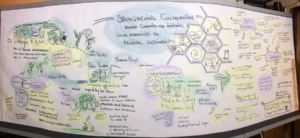
GOSSIP updates (18/09/20)
British Society of Population Studies Annual (Virtual) Conference
OBANGAME EXPRESS (Virtual) Senior Leadership Symposium
Ife Okafor-Yarwood gave a presentation on Tuesday at the 10th OBANGAME EXPRESS (Virtual) Senior Leadership Symposium organised by the United States Naval Forces (NAVAF) in conjunction with United States African Command (AFRICOM). She discussed the changing trend on maritime piracy and armed robbery at sea in West and Central Africa and among other things reiterated the imperative for coastal states and their partners to prioritise improving coastal welfare together with enhancing the capabilities of the navies and relevant marine agencies. The exercise was due to be held aboard a US naval vessel off the coast of Ghana in March this year, but, was cancelled due to COVID. Ife adds “The online presentation is not the same as meeting people in person, however, it is so humbling to be able to share my work with those responsible for policing the African maritime domain and their international partners”.
Infrastructures: Anthrogeographies of the state as an absent presence
Antonis Vradis, together with Elisabeth Kirtsoglou (Durham Anthropology) convened a double panel at “Anthropology and Geography”, the conference jointly organised by the RAI, the RGS, the British Academy, the Department of Anthropology and Sociology at SOAS, and the BM’s Department for Africa, Oceania and the Americas. Elisabeth and Antonis’ panels on “Infrastructures: Anthrogeographies of the state as an absent presence” saw 16 papers presented on infrastructures and the state and the proceedings are to be published as a Special Issue. https://nomadit.co.uk/conference/rai2020#8351 and https://nomadit.co.uk/conference/rai2020#9535.
Going back to my rural roots: Covid 19 and return migration in northern Peru (26/08/20)
This research, funded by the SFC Global Challenge Research Fund, focuses on the migration of people who have moved from the urban centres to rural communities as a result of unemployment and physical, social and economic distress caused by the current pandemic. The project aims to explore and analyse the consequences that migration has had at the level of employment, livelihoods, access to healthcare (and other state resources), social support mechanisms, environment impact and household changes (including gender relations).
The lock down in Peru, one of the most severe in Latin America, imposed by the military with a nightly curfew is due to be lifted at the end of the month. There is a very brief window to capture the experiences of those who have migrated from various urban centres back to rural communities, including those who will choose to return soon after lockdown has ended. The urgency of this project rests in the temporality of this migration, especially with regard to the responses that the rural communities hosting returnees have developed. What are the expectations of returnees? What is the socioeconomic and gender profile of those returning to their communities? Is this migration temporary or permanent?
For more information, please visit the Centre for Amerindian and Latin American Studies’ website.
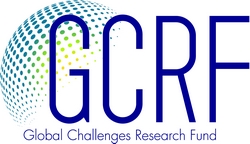
The centrality of ‘folk, place and work’ in the UN SDGs (19/08/20)
Rehema White of GOSSIP worked in partnership with Universities of Dundee and Aberdeen, Land Commission and Falkland Estate to win a Scottish Universities Insight Institute award for a programme entitled The centrality of ‘folk, place and work’ in the UN SDGs: learning with Falkland Estate towards Scotland’s Land Use Strategy.
The programme will investigate how we can address the interactions between SDGs, draw on lessons from Scotland and elsewhere regarding sustainable land use and governance and provide practical recommendations for particular regions and for policy, especially Scotland’s Land Use Strategy, the Land Rights and Responsibilities Statement, the Community Empowerment Act and the SDGs.

GOSSIP updates (14/08/20)
Pedagogies for sustainability: addressing institutional inequalities and promoting sustainable tourism in northern Thailand
A reflective blog by Uthumphorn Kankeb (Praew), PhD student in the School of Geography and Sustainable Development
Chiang Rai province is located in the northernmost part of Thailand, bordering on Myanmar and Laos. It is a mountainous region with rivers and jungles, so there is a lot of beautiful nature surrounding the area. The population of Chiang Rai includes people of various ethnic backgrounds, including those from hill tribes and Chinese lineage. This shapes Chiang Rai’s unique traditions and makes the city an excellent and novel location for tourists to experience. A vision of the local Chiang Rai Rajabhat University (CRRU) is to be a leading higher education institution for local and Mekong sub-regional development. The university provides educational opportunities, promotes the creation of a lifelong learning society and improves the quality of life of people in local and ethnic groups. Diverse ethnic minorities study in the university and need equality interventions and relevant curricula. The integration of academic services, research, and teaching and learning build understanding, pride, and recognition of the values of ethnic minoritiesand reduce racism. Student projects are the outcomes of teaching and working with local community and ethnic groups to develop and strengthen a sustainable community.
I am a part of CRRU as a lecturer but now I am taking leave for my PhD study in the University of St Andrews. When working at CRRU, I designed my teaching to support racial equalities. For example, I designed my teaching of Tourism Project Management to integrate with other subjects including Sustainable Tourism, Community-based Tourism Management, Tourism Planning and Development, and Research Methodologies for Tourism with other Thai lecturers. This academic integration focused on local community and ethnic groups. We asked our students to create tourism projects in order to develop sustainable tourism for the local community, particularly ethnic groups such as Karen, Akha, and Lahu. We controlled and monitored our students’ work. Each project group had mixed members of local students and hilltribe students to work together. We allowed students to choose the project area in Chiang Rai and to explore the problems or needs of the local communities. The students gained local community permission before doing their project. When working on project, they learned how to approach and work properly with the local communities in applying theories and knowledge from different subjects. Some projects were about creating programmes for ecotourism, voluntourism, gastronomy tourism, creative tourism, adding value to local or hilltribe products, and marketing sustainable tourism via social media. The outcomes of student projects benefited local people by exchanging academic knowledge and local culture and also made students proud of their hard work on their projects. Moreover, the connection with the local communities, students and lecturers contributes to a good relationship with the university as well.This inspires me to work and do research on community based tourism that relates to my PhD project now.
For more information of student projects please visit https://www.facebook.com/HuaikhomCBT. The Facebook page was created by students and shows different student projects.
Below are some photos from students working together on their projects.
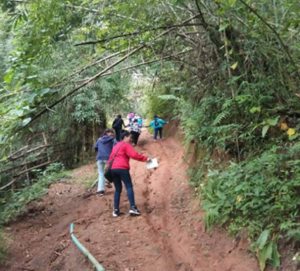
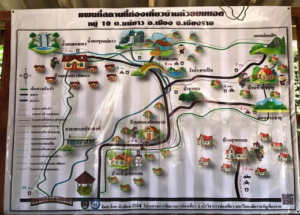
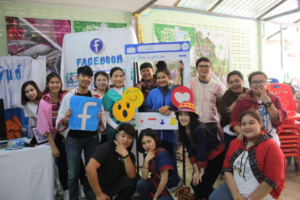
New date for the Global Conference of UN RCEs in ESD
Along with most other conferences this year, the Global Conference of UN Regional Centres of Excellence in Education for Sustainable Development that was supposed to run after COP26 has been delayed until 18-21 June next year. Rehema White is a member of the organising committee (between Learning for Sustainability Scotland and UNU). We are grateful for a small SAGES grant to help support conference activities.
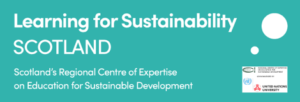
Publication of report on Scotland’s progress on the UN SDGs
The Scottish Government has finally published the review of progress on the SDGs in Scotland, which can be viewed at https://www.gov.scot/publications/scotland-sustainable-development-goals-national-review-drive-action/. The review was the result of an interesting partnership between Scottish Government, civil society and academia through the SDG Network. Rehema White was a member of the interim steering group that led this. The partnership itself is worthy of consideration eg see Paul Bradley’s blog at: https://scvo.org.uk/p/39860/2020/08/05/a-social-approach-to-partnership-on-the-sdgs.

Extension for research on vulnerabilities to climate change by smallholder farmers in Mexico and Guatemala
We are delighted to hear that Sofia Mardero has had her postdoctoral funding extended for a further year, working with Rehema White. She will be working on VULNERABILIDAD DE LOS CAMPESINOS AL CAMBIO CLIMÁTICO Y EL PAPEL DE LA CONSERVACIÓN EN LA FRONTERA AGRÍCOLA DE LA SELVA MAYA DE CALAKMUL, MÉXICO Y PETÉN, GUATEMALA. Congratulations Sofia!
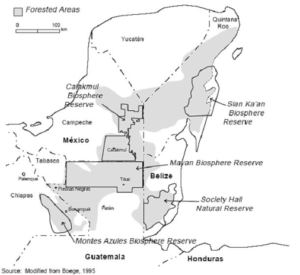
UK to lead post-El Niño Costero reconstructions in Peru (23/06/20)
SGSD researchers on the “Farming and Fishing in the Desert” research project share the news that the UK will be leading in post El Niño Costero reconstructions in Peru. Also this week the project’s Peru-based coordinator Oliver Calle , working with NGO partner PRISMA, oversaw the handover over of tablets to students and families from Daniel Alcidez Carrion school in Mala Vida, Sechura. Phones were originally included in the project design as a way to enable students to record inter-generational oral histories of about Niño experiences over the years. Lockdown as a result of Covid 19 changed the team’s plans and now project issued tablets will also provide a vital means of facilitating students to access online materials and work with their teachers for the first time since December 2019 when the last school year ended.
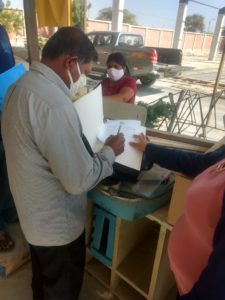
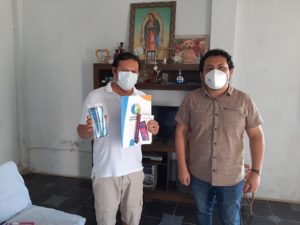
English translations of Peruvian news articles from 23rd June 2020: “The UK has won the concession to undertake urgent reconstruction work still needed in Peru following the devastating caused by the El Niño Costero in 2017.”
President Martín Vizcarra announced that the United Kingdom was the winner of the contract through which reconstruction works will be carried out in the areas affected by the El Niño Coastal Phenomenon. Minutes later, the United Kingdom ambassador to the Country Kate Harrisson said she was “delighted” with the choice.
“I am delighted that Peru has chosen the United Kingdom to develop this important program of rebuilding vital infrastructure. We are committed to working hand in hand with @AutoridadRCC to build hospitals and schools,” wrote the ambassador on her social networks.
Likewise, she expressed that they would focus on “reinforcing the work on flood prevention and ensuring a knowledge transfer program that secures its continuity in future projects.”
The president announced at a press conference that the nations will invest S / 7 billion in reconstruction works over a two-year period, the time it will take to complete the projects. For the second half of this year, the Peruvian government anticipates that around S / 1,500 million of the total amount will be invested.
According to Vizcarra, the program stipulates that 15 hospitals will be built in Piura, Lambayeque, La Libertad, Áncash and Lima.
In the education sector, both governments are going to work on the construction of 74 educational institutions in regions such as Tumbes, Piura, Lambayeque, La Libertad, Áncash, Lima, Cajamarca and Huancavelica.
The head of state also explained that Tumbes, Piura (Sullana and Paita), Lambayeque (Chiclayo), La Libertad (Trujillo) will have storm drainage systems to minimize the impact of the natural phenomenon.
Likewise, comprehensive treatment will be provided to 17 rivers on the Peruvian coast affected by El Niño and streams such as Huaycoloro and San Ildefonso.
Translation from https://elcomercio.pe/economia/peru/reino-unido-le-agradecio-al-peru-por-elegirlo-para-efectuar-las-obras-de-reconstruccion-con-cambios-nndc-noticia/
Yesterday the government-to-government agreement signing ceremony between Peru and the United Kingdom was carried out for the execution of Reconstruction works in 9 regions affected by the El Niño phenomenon.
“We cannot allow nature to punish us every certain period of the year because we do not make definitive but palliative interventions. We want a comprehensive solution so that damage and destruction can be controlled in the future”, stated the President of the Republic, Martín Vizcarra.
Also, British Prime Minister Boris Johnson stressed that the agreement will make it possible to repair the damage caused more than three years ago.
“It couldn’t be more on time because the devastation caused by El Niño in 2017 showed us all that climate change is important, it is happening right now and we must face it today. This agreement will help us repair the damage caused by nature three and a half years ago, “he said.
Execution goals
With an investment of S / 7,000 million, it seeks to deliver 120 projects, which will generate approximately 30,000 direct jobs in the first two years (2021-2022).
Through this agreement, the United Kingdom will provide technical assistance for the construction of integral solutions in the management of 17 rivers, 5 streams and storm drainage in 7 coastal cities. In addition, the contract will promote the reconstruction works of 15 health establishments and 74 schools.
The projects are located in Tumbes, Piura, Lambayeque, Cajamarca, La Libertad, Áncash, Lima, Ica and Huancavelica.
For this year, the Authority for Reconstruction with Changes (ARCC) plans to launch tenders valued at S / 1,000 million. The first calls for business contracting processes will begin in August.
What does this model contract consist of?
Through technical assistance in Program Management (PMO), the British Government will provide the necessary internal governance structure, strategy and processes to align the activities of the entire ARCC for the timely delivery of all works.
In this way, they will carry out the detailed follow-up and monitoring of the entire schedule, costs, changes, information, risks and opportunities.
They will also be in charge of contracting for the provision of goods and services, preparation of technical files and the execution of works.
“This process will be agile and transparent and will encourage the participation of multiple bidders with a contracting platform that allows them to be tracked,” said the ARCC.
It should be noted that this is the second Government-to-Government agreement signed between Peru and the United Kingdom, which will follow the same execution model implemented for the Lima 2019 Pan American Games.
“In the midst of the Covid-19 crisis, the UK is committed to working with the Reconstruction Authority to ensure a robust knowledge transfer program for large infrastructure projects,” said UK Ambassador to Peru Kate Harrisson .
Declarations
Martín Vizcarra. Republic President:
“We are thinking not of a short-term reconstruction, but of long-term projects that the population demands. It is not only investment and jobs, it is improving the standard of living of citizens.”
Boris Johnson. British Prime Minister:
“This project will also help put Peru, its economy, and its people on the path to a more resilient and inclusive future. We are committed to working with transparency, efficiency and sustainability”.
Translation from: https://larepublica.pe/economia/2020/06/23/reconstruccion-con-cambios-peru-y-reino-unido-firman-convenio-de-reconstruccion.
£1.2m GCRF Research Fund 2020-21 launch (19/06/20)
As part of the University of St Andrews GCRF Forum Nina Laurie (Director) and Katy Roucoux (Steering Group Member) were involved in the launch of the 2020-21 St Andrews £1.2m GCRF research fund.
Alongside this the Forum also issued a GCRF statement in support of Black Lives Matter:
“As academics working in ODA countries on Global Challenges projects, we stand in solidarity with Black Lives Matter, and with disadvantaged communities across the globe. We recognise that universities, and the research and teaching that takes place there, have been part of a wider systemic framework that has seen minority voices silenced, and that has seen racism go unaddressed. In all our projects, with all our partners globally, we are actively working to promote academic practice that is centred upon equity and that acknowledges injustices with current structural privilege. We commit to continue to prioritise projects that support equitable attitudes and recognise that we still have more to learn together through our collaborations.”
Please also refer to the University of St Andrews equality policy.
#Strike4BlackLives #ShutDownAcademia (10/06/20)
Today, as we #strike4blacklives #shutdownacademia #shutdownSTEM, it is worth contemplating that racial injustice kills in many ways in addition to overt police brutality.
Dr. Jo Hale is happy to discuss if you’d like to contact her, but here’s a brief(ish) explanation:
What this figure shows is premature mortality in the USA – people who die “before their time.”
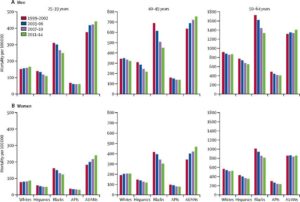
So, for example, AI/AN people in all age groups suffer substantially more premature mortality than their White counterparts, as do Blacks. You can start seeing chronic health diseases (what I study) take their toll on Blacks in the older age groups. You can also see what’s called the “Hispanic Paradox” (that Latinx pops in the US live longer than their socioeconomic status would predict; lots of literature on this!)
The paper shows the breakdown by causes of death as well.
Source: Shiels, Meredith S., et al. “Trends in premature mortality in the USA by sex, race, and ethnicity from 1999 to 2014: an analysis of death certificate data.” The Lancet 389.10073 (2017): 1043-1054.
Luis Repetto Málaga
Thoughts and solidarity go to the family and friends of Luis Repetto Málaga, b. 1953 who passed away in Lima, Peru on 9th June 2020. Luis was the Peruvian Principal Investigator on the EU-LAC-MUSEUMS project coordinated by Karen Brown of the School of Art History (http:www.eulacmuseums.net). He was a national and international legend in the museum and heritage field. Luis and Karen worked together for four years on the topic of museums, community and sustainability in northern Peru.
Karen brings this experience of collaborative research in Peru on history to the SFC GCRF ‘Farming and Fishing in the Desert’ project http://impact.wp.st-andrews.ac.uk/fishing-and-farming-in-the-desert/, where she is working with Richard Bates (Earth Sciences), Dan Clayton and Nina Laurie (GOSSIP) and Pavel Elías Lequernaque and Alexa Correa from the University of Piura.
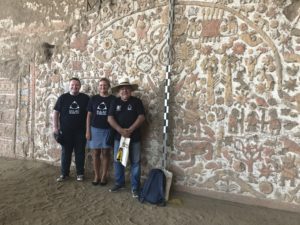
An article of his project research can be found here: https://www.tandfonline.com/doi/full/10.1080/13500775.2019.1702258
For more details see:
http://umac.icom.museum/luis-lucho-repetto-malaga-1953-2020/
GOSSIP updates (20/05/20)
Laurie makes it “Two Busking Profs’ for GOSSIP (May 2020)
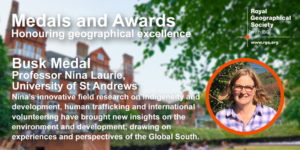
Nina Laurie has been awarded the prestigious Busk Medal from the Royal Geographical Society with the Institute of British Geographers (IBG) for her contribution to “social inclusion, international development and environmental sustainability through fieldwork and research”.
The award recognises Nina’s work with marginalised and indigenous people in South America and South Asia.
https://news.st-andrews.ac.uk/archive/st-andrews-academic-recognised-with-award/
Jo Sharp also holds the same medal, which recognised her “innovative field research and empowering others through fieldwork, in 2016.
Nina Laurie, académica de la Universidad de Saint Andrew, la más antigua de Escocia, fue premiada con la Medalla Busk de la Royal Geographical Society por su contribución a la inclusión social, el desarrollo internacional y lasostenibilidad ambiental a través del trabajo de campo y la investigación. Actualmente, está a cargo del proyecto de Investigación “Fenómeno de Oportunidades”, un trabajo en conjunto con Prisma y otras instituciones.
Publication of “Imagine a country”
March saw the publication of the book Imagine a country, that Jo Sharp edited with Val McDermid for Canongate. The publication blurb says:
“The first step on the road to change is to imagine possibility.
Imagine A Country offers visions of a new future from an astonishing array of Scottish voices, from comedians to economists, writers to musicians. Edited, curated and introduced by bestselling author Val McDermid and geographer Jo Sharp, it is a collection of ideas, dreams and ambitions, aiming to inspire change, hope and imagination. Featuring:
ALI SMITH, PHILL JUPITUS, A.L. KENNEDY, ALAN CUMMING, KERRY HUDSON, GREG HEMPHILL, CAROL ANN DUFFY, CHRIS BROOKMYRE, ALISON WATT, ALASDAIR GRAY, LEILA ABOULELA, IAN RANKIN, SELINA HALES, SANJEEV KOHLI, JACKIE KAY, DAMIAN BARR, ELAINE C. SMITH, ABIR MUKHERJEE, ANNE GLOVER, ALAN BISSETT, LOUISE WELSH, JO CLIFFORD, RICKY ROSS, TRISHNA SINGH, CAMERON McNEISH, ALEXANDER McCALL SMITH, CARLA JENKINS, DON PATERSON, AND MANY MORE …”
It is a book about hope and it seems more relevant now than when we started putting it together in September! We have 97 contributions covering topics from education to conservation, the arts to our non-human fellow citizens.
We were to have a launch at the Aye Write festival in Glasgow next week but obviously this has been cancelled. We had a virtual event in its place which can still be seen here: https://t.co/1tZ4ps6PQe?amp=1.
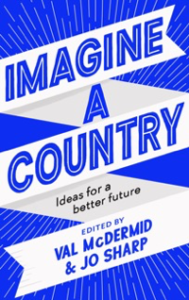
Lockdown in Peru
Sustainable Futures in Africa workshop
Last year Jo Sharp co-ran a GCRF-funded workshop with the Glasgow-based Sustainable Futures in Africa network to discuss how to achieve equitable research partnerships across continents, contexts and disciplines. They published a booklet from the event and electronic copies are available from the SFA website.

Stable Seas: Gulf of Guinea
New Lecturer Ife Okafor-Yarwood contributed to an outstanding report which gives a holistic view on maritime governance and security in the Gulf of Guinea. The report titled, “Stable Seas: Gulf of Guinea” explores the connections between crime and insecurity in the maritime domain and insecurity and instability onshore in the West and Central African region. Through interviews conducted with experts and practitioners in seven countries across the region, the report examines nine themes of maritime governance and security and how they impact coastal communities and landlocked neighbors throughout the region. These themes are international cooperation, maritime enforcement capability, rule of law, blue economy, coastal welfare, fisheries, piracy and armed robbery at sea, illicit trades and maritime mixed migration. Read the report here.
GOSSIP updates (19/05/20)
New PhD scholarships awarded
We are pleased to announce that the SGSD PhD Scholarships 2020 have been awarded to:
- Hellen Atieno Onyango, for the project ‘Improving diagnosis and care for bacterial infections: Children’s treatment pathways and antimicrobial resistance (AMR) in Western Kenya’, supervised by Katy Keenan and Mike Kesby (GOSSIP/PH Research Groups)
- Alejandro Pizarro Choy, for the project ‘The politics of emerging discourses in conservation: Counter wildlife trafficking programmes in South America’, supervised by Jess Hope, Mike Simpson and Nina Laurie (EC/GOSSIP Research Groups)
Successful defence of Hebe’s PhD thesis!
A happy note from Hebe Nicholson – sorry, we mean Dr Nicholson!
She reports: “I am delighted to say that I successfully defended my PhD viva on the 12th May with minor corrections. My PhD is titled Government Resettlement as Participatory Adaptation to Climate Change: Exploring the Role of Knowledge in the Lower Shire Region of Malawi and it was supervised by Dr David McCollum and Professor Nina Laurie. It has been quite a journey, starting in population geographies and ending more in development geographies, and it feels good to be close to final completion!”
Congratulations to Hebe, and thanks to her supervisors and her examiners.

Welcome to new member of staff Ife
We are delighted to welcome another new member of staff:
My name is Dr. Ifesinachi Okafor-Yarwood. I joined the School of Geography and Sustainable Development in May. I have a Ph.D. in Leadership, Security, and Development from King’s College London. My research to date has generated critical insights around the blue economy, maritime governance, and security. In particular, I have explored the food, economic, and environmental security implications of pollution, climate change and illegal fishing and the role of (in)effective state institutions in exacerbating adverse outcomes therefrom across West and Central Africa. I uncovered strong feedbacks in this inter-relationship – such as how people respond to resulting vulnerabilities can undermine the stability of the nation-state. Looking ahead, I would like to continue advancing the understanding of the relationship between natural resource governance, conflict, and the disproportionate effects of depleting resources on security, poverty, and inequality.
Welcome to the group Ife!
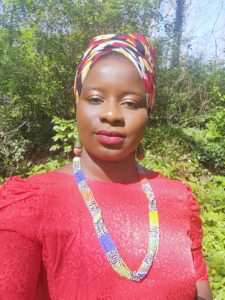
Welcome to new member of staff Mike
We are delighted to welcome a new member of staff. Mike Simpson joined the School of Geography & Sustainable Development from the University of British Columbia in 2020. Engaging in the fields of political ecology, political economy, and urban geography, his current research examines conflicts over infrastructures of fossil fuel extraction and circulation, and how these infrastructures produce settler colonial space in North America.
Welcome to the group Mike!
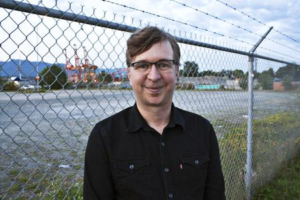
Mitigation of the effects of COVID-19 crisis in coastal Kenya
Tim Stojanovic’s new project “Mitigation of the effects of COVID-19 crisis in coastal Kenya” has been funded for work in coastal Kenya from May to July 2020 to help mitigate the effects of the COVID-19 crisis on local communities. Funding is from the rapid response funding stream of St Andrews Global Challenges Research Fund UK/Scottish Funding Council. The project aims to protect the marine environment of the Kenyan coast and improve the social welfare of communities for whom COVID-19 has been extremely challenging. The work is being led by Dr Tim, and is part of a wider GCRF project on Community Capabilities and Marine Protected Area Governance involving Dr Althea Davies (SGSD) and Dr Maria Dornelas (Biology) a second year SD intern, and NGO partners. The rapid response project is one attempt for our project to respond in a smart way to the C19 crisis.
Help us watch out for the next plant pest!
Rehema White and Althea Davies are involved in the project BRIGIT, which is a consortium of 12 organisations across entomology, plant pathology, ecology, epidemiology, genomics, molecular biology and the social sciences. It builds the UK’s capability to prevent establishment of vector-borne plant pathogens and to increase our preparedness to respond should they be introduced, focusing in particular on the potential introduction and need to manage and eradicate Xylella fastidiosa. This is a bacterial disease which lives in the xylem of plants and is transmitted by insects that feed from the xylem and which can thus acquire Xylella and transmit the bacterium to other host plants. It has had devastating effects across Europe, especially on plants such as olive trees and lavender. There is great concern that it may enter the UK and uncertainty about what host plants might be affected. In order to help us understand potential vectors, we have a citizen science element where you can collect and submit data. This has been affected by the Covid-19 lockdown, but you can still take part in your gardens or in permitted activities close to your house. This video shows you how you can become a spittle bug spy!
More general information at https://www.jic.ac.uk/brigit/
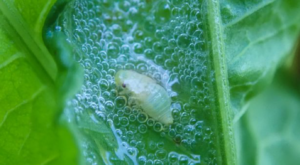
Vote for paper on circular economy and sustainable development!
Graduated Honours student Neal Millar writes that as part of the Review Essay module during his undergraduate degree in our School, he wrote a paper on the relationship between the Circular Economy and Sustainable Development. Afterwards, he was fortunate enough to publish the paper along with past staff members Eoin McLaughlin and Tobias Borger
Millar, N. McLaughlin, E. Börger, T. (2019) The Circular Economy: Swings and Roundabouts? Ecological Economics 158,11- 19 https://doi.org/10.1016/j.ecolecon.2018.12.012
He just received an email from the International Sustainable Development Research Society informing him that their article had been shortlisted for their 2019 “Best Article Award” http://isdrs.org/shortlist-2019/
Please take a moment to vote for this article! You have to make an account to vote but it takes less than a minute.
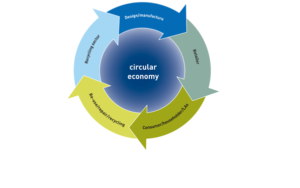
https://www.wrap.org.uk/about-us/about/wrap-and-circular-economy
New QAA guidelines for Education in Sustainable Development being written
The Quality Assurance Agency supports the integrity of educational processes in Universities across UK. They brought out guidelines on why and how to teach education for sustainable development (ESD) in Higher Education in 2014, after significant consultation with the sector. However, it is now time to update these guidelines to reflect greater mainstreaming of ESD, the UN SDGs and a different political and environmental context. Rehema White was appointed a member of the group, which aims to develop a draft framework by end May and a report on guidelines by October 2020. Watch this space for updates; we are informing the process through our experiences here and will be integrating the latest ideas into the Sustainable Development Programmes at the University of St Andrews.
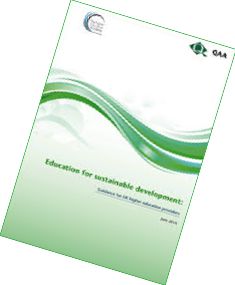
Exploring relevance and approaches in Learning for Sustainability in times of crisis and calm
Over the past few weeks people around the world have risen to the challenge of responding to global challenges manifesting at local levels. We are ALL touched by Covid-19, and each of us has had to reflect individually on what really matters to us. Learning for sustainability is about working to create a flourishing, equitable and sustainable world. What do the current challenges mean for us, our work and our planet?
Scotland’s UN Regional Centre in Education for Sustainable Development, Learning for Sustainability Scotland, is running an interactive webinar on Wednesday 3rd June 12.30 – 2pm which aims to:
- critically reflect on the current and future need for Learning for Sustainability approaches
- explore the relevance and contribution of LfS in the current Covid 19 context and in future periods of crisis and calm
- share and celebrate the approaches of LfS practitioners from around Scotland who have found new ways of working to engage their communities
- inspire new thinking and approaches for the future
Click HERE to register
There will be presentations by Rehema White, University of St Andrews, examples of good practice from across different sectors, interactivity and opportunities to discuss your own experiences in smaller groups.
GOSSIP Updates (15/10/19)
Collaboration between GOSSIP and CREEM
Rehema White gave a talk in CREEM (Centre for Research in Ecological and Environmental Mathematics) on 2nd October to encourage research collaboration. She briefly outlined the different research groups in the School then described GOSSIP research themes and interests. By outlining a case study project, she demonstrated the interdisciplinary and engaged nature of much of our research. There was discussion of potential areas for collaboration. For example, CREEM researchers are world class at estimating wildlife populations, perhaps adding statistical rigour to some of our mixed method projects. GOSSIP researchers are adept at contextualising projects within wider sustainable development themes, perhaps adding breadth and context to species specific research at CREEM. We discussed some wild card ideas and also the possibility of interrogating the nature of science itself, especially in this era of ‘fake news’. We already have a joint project exploring snow leopard populations and management, with our new PhD student Tamsin Rigold. GOSSIPers are encouraged to consider CREEM collaboration where appropriate; an additional point in their favour is that they often have cake!

Training for interdisciplinary PhD supervisors
Interdisciplinary PhDs can be challenging for students, but also for supervisors. The Graduate School held a workshop on 7 October for supervisors who were successful in the St Leonards Interdisciplinary PhD competition. We explored epistemological issues and practical problems that may arise. Where does a student sit? How do you determine chapter and publication focus? How do you reconcile mixed methods without asking for two PhDs in effort? What are the long term career aims of the student and how do you ensure that they retain options in both disciplines if they wish? How do you ensure that review and examination processes are fair? Laura Meagher gave an excellent introduction to these issues. Those seeking more insights and some useful tools could read Lyall et al (2011) on research practice. Rehema White will bring some of this learning to the School Lunch and Learn later this semester.
Welcome to Sofia and Birgit from Mexico!
Welcome to Sofia Mardero, who is starting a postdoctoral position with Rehema White with her Mexican CONACYT funded project Understanding vulnerabilities from climate change at the forest-agriculture interface around the Selva Maya forest. This research ties in with GCRF projects past and present that include Birgit Schmook from ECOSUR Chetumal in Mexico. Birgit will be visiting for three weeks in connection with this research. Please say hello to both in the common room and in our discussion sessions.

The afterlives of psychogeography (24/04/19)
GOSSIPERS were delighted to welcome Prof Alastair Bonnett, from the University of Newcastle, to give a seminar on ‘the afterlives of psychogeography’ this week. Alastair’s talk was a welcome break for those of us subsumed by marking/ moderating and offered some new perspectives and ideas on how we may approach our engagement with place. In his talk, Alastair mapped the use of magic in the recent history of psychogeography to show how modern landscapes, and particularly cities, may be (re)imagined. Examining work of the London Association of Psychogeographers, Nick Papadimitriou’s (2013) book Scarp, and Gareth Ree’s (2013) book Marshland, Alastair discussed the magical significance of the symbols of capitalist power in modern cities (specifically Canary Warf and Newcastle’s A167 motorway), and how magic has been used by psychogeographers to ‘reenchant’ a new localism. Reflecting on magic as processual and acknowledging its relevance to scholarship on performance in geography, Alastair noted the importance of walking as an artform, and as a mechanism to engage with both place and magic. Discussing experiences of walking with his brother (and to the Boys Village in South Wales), throughout his talk, Alastair reflected on issues of alienation, redemption and vulnerability, encouraging us consider the connections between psychogeography, magic, and new forms of localism. In all, it was a talk with something for everyone – thank you Alastair!
Geography, colonialism and the experience of dwelling
Dan Clayton has just written a review of a book by historical geographer Cole Harris which reflects on geography and colonialism in Canada, and more widely on what, following the French geographer Michel Lussault, Dan calls ‘the experience of dwelling’. Links to this piece can be found in The Ormsby Review and in BC BookLook.
Exhibition Opening at the Cooper Gallery (Dundee)
‘Politics of Small Places’ is an ongoing exhibition at the Cooper Gallery (Dundee) bringing together work by contemporary artist and Turner Prize nominee Paul Noble, and pioneering Scottish urban planner Patrick Geddes (1854 – 1932). To celebrate the opening of the exhibition, GOSSIP member Dr Louise Reid, with Dr Lorens Holm (Dundee) and Paul Noble, participated in a public event exploring recent debates on sustainability, urbanism and globalism. It was a sell-out event on a very special evening for Dundee, coinciding with the opening of the new V&A museum.
Tom Smith PhD and Post-doc
Passed his PhD viva in December 2017, with no corrections and many commendations from the internal and external examiners, Dr Mike Kesby and Dr Pete North. His project, entitled Geographies of the Maker Movement, was supervised by Emilia Ferraro and Louise Reid, and latterly by Dan Clayton. Tom will Graduate this June, and has recently published articles in Progress in Human Geography, and Scottish Geographical Journal.
Tom has also secured a two-year (and tenure-tracked) post-doctoral position in Environmental Studies at Masaryk in Brno, Czech Republic, with a focus on community/solidarity economies, starting in late July. Tom reports that there are very interesting colleagues and initiatives going on there, and that’s he’s really excited to start.
We are doubly delighted for Tom!
McKee and Leahy Secure Funding for Immigration Act Event
GOSSIP-ers Drs Kim McKee and Sharon Leahy have secured funding from the Housing Studies Association to host an event on the UK Immigration Act, which will be held in St Andrews in the summer. This one-day symposium will bring together inter-disciplinary critical scholars, activists and colleagues from policy and practice to discuss emerging research on the UK Immigration Act and its impact on housing and other public services. One of the key facets of this legislation is the ‘Right to Rent’ provisions, which require private landlords to conduct identity checks prior to letting their property. These requirements have significant implications not only for non-UK citizens, but also for those UK citizens who cannot readily prove their ‘British’ status. It also places a new duty on landlords to ‘police’ the border. Moreover, given that immigration is a reserved power of the UK Westminster government, whilst housing is devolved, it is a policy which opens up interesting governing tensions.
Against the backdrop of the broader ‘hostile environment’ being fostered by the current Conservative government in Westminster this event seeks to bring together researchers and key stakeholders working on this contemporary, and continually evolving policy issue, in order to drive forward scholarly debate, and inform and influence policy and practice.
For more information please contact Dr Kim McKee (Director of the Centre for Housing Research.)
GOSSIP hellos and goodbyes!
Welcome back
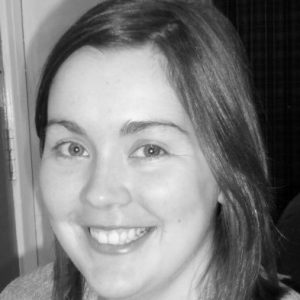 Dr Kim McKee returned from a year’s maternity leave in November, after giving birth to a little boy called Calum in 2016.
Dr Kim McKee returned from a year’s maternity leave in November, after giving birth to a little boy called Calum in 2016.
Kim will be assuming her role as co-investigator in the ESRC/AHRC/JRF funded UK Collaborative Centre for Housing Evidence (CaCHE). As part of the Centre’s programme of work in 2018 she will be leading an exemplar project on the ‘Frustrated’ Housing Aspirations of Generation Rent, supported by Dr Adriana Soaita (Research Associate, University of Glasgow). This project builds on Kim’s longstanding interest in the housing inequalities experienced by young people in the UK today.
Sustainability in the Curriculum Symposium
Dr Katherine Ellsworth-Krebs (School of Geography and Sustainable Development) and Dr Shona Russell (School of Management), in collaboration with Dr David Evans (Pro-Dean Curriculum – Arts & Divinity), Mr David Stutchfield (Estates) and Dr Rehema White (School of Geography and Sustainable Development), have been successful in this round of the Teaching Development Fund for a ‘Sustainability in the Curriculum Symposium’. This project will create opportunities to discuss and further develop the pedagogical approaches that are being undertaken, or could be used, to enhance sustainability-related learning and teaching (SLT) at our institution through a one-day cross-institution symposium and development of a digital archive of SLT activity. This project has been developed in partnership with Pro-Deans Curriculum (Drs Martin Campbell and Sharon Leahy), Transition University of St Andrews (Mr Alistair Macleod and Dr Ailsa McKenzie) and the Sustainable Development Working Group headed by the Quaestor.
The University of St Andrews has been recognized nationally as a leader in sustainability teaching (e.g. Times Higher Education Award for Outstanding Contribution to Sustainable Development and the UK Universities that Count 2010 Report), operational sustainability (Scottish Green Energy Award for Guardbridge Biomass 2016, energy efficient data centre hold a Gold CEEDA award 2014) and student engagement through Transition University of St Andrews (Green Gown Awards and repeated funding from Scottish Government). In response to increasing requirements to report on climate change impacts, this project supports the University’s strategic commitment to sustainability by documenting and highlighting innovative sustainability learning and teaching practice.
If you want to know more about the project please contact Dr Katherine Ellsworth-Krebs ([email protected]) or Dr Shona Russell ([email protected]).
Launch of UK Collaborative Centre for Housing Evidence
The UK Collaborative Centre for Housing Evidence (CaCHE) held its launch event on the 18th October in Parliament Square, London.
Funded by the ESRC, AHRC and the Joseph Rowntree Foundation, CaCHE is a new national research centre which aims to tackle the complex housing problems at a national, devolved, regional and local level. It involves eleven partner organisations including the University of St Andrews (Co-investigator, McKee, School of Geography & SD).
The launch event was hosted by the Royal Institute of Chartered Surveyors (RICS), included keynote presentations from:
- Lord Bob Kerslake, Chair, CaCHE Advisory Board
- Professor Ken Gibb, Director & Principal Investigator, CaCHE
- Dr Emma Stone, Director of Policy & Research, Joseph Rowntree Foundation
- Matthew Howell, Managing Director for UK & Ireland, RICS
The successful event brought together CaCHE members and key partners from policy, practice and academia, providing an opportunity to learn more about the research CaCHE will be undertaking over the next 5 years.
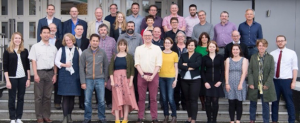
The photo shows CaCHE members at our recent Autumn retreat in Glasgow.
McKee Publishes New Book on Urban Governance!
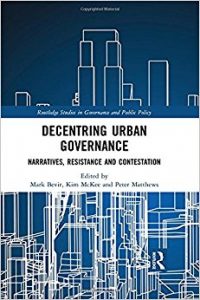 SGSD Senior Lecturer Dr Kim McKee has published a new book: ‘Decentring Urban Governance: narratives, resistance and contestation’ as part of Routledge’s Governance and Public Policy series. Co-Edited with Professor Mark Bevir (UC Berkeley) and Dr Peter Matthews (Stirling), the book emerges from a workshop that Kim co-organised with Mark at the University of California, Berkeley in 2016.
SGSD Senior Lecturer Dr Kim McKee has published a new book: ‘Decentring Urban Governance: narratives, resistance and contestation’ as part of Routledge’s Governance and Public Policy series. Co-Edited with Professor Mark Bevir (UC Berkeley) and Dr Peter Matthews (Stirling), the book emerges from a workshop that Kim co-organised with Mark at the University of California, Berkeley in 2016.
Decentring Urban Governance: narratives, resistance and contestation seeks to rethink governance not as a particular state formation, but as the diverse policies emerging associated with the impact of modernist social science on policy making, considering the diverse meanings that inspire governing practices across time, space, and policy sectors in an urban context.
Taking an interdisciplinary approach, the book goes beyond neoliberalism, and is interested in other webs of meaning through which actors encounter, interpret, and evaluate social science, which have received less analytical attention. All these different webs of meaning – elite narratives, social science, and local traditions – influence patterns of action. The book creates an analytical space by which to consider situated agency and localised resistance to the discourses and policies of political elites, including the myriad ways in which local actors have resisted practices of governance on the ground.
This text will be of key interest to scholars, students and practitioners of urban governance, governance and more broadly to the social sciences, housing, social policy, sociology, geography, law and welfare studies.
Contributors include:
- Dr Janice Astbury (Durham)
- Dr Yasminah Beebeejaun (UCL)
- Dr Peter Campbell (Liverpool)
- Professor Helen Carr (Kent)
- Dr Richard Crisp (Sheffield Hallam University)
- Professor John Flint (Sheffield)
- Dr Dave O’Brien (Edinburgh)
- Professor Antonia Layard (Bristol)
- Dr Peter Matthews (Stirling)
- Mr Ryan Powell (Sheffield)
- Dr Jenny Wood (Heriot-Watt)
New research centre to inform housing policy in the UK
The University of St Andrews is a key partner in a new UK Collaborative Centre for Housing Evidence (CaCHE).
The Centre will launch on 1st August 2017 for five years and will receive £6 million of funding from the Economic and Social Research Council (ESRC), with support from the Joseph Rowntree Foundation and the Arts and Humanities Research Council (AHRC). A further £1.5m of funding will come from the consortium itself.
The new national research centre, which will be independent from government and other interests, is a collaboration between nine UK Universities and four non-HEI organisations.
Housing has a considerable impact on our society and economy. Almost 1 in 10 British jobs are in the housing sector, and more than a fifth of household spending goes on rent, mortgage payments, home repairs, maintenance and improvements. The availability, cost and design of housing impacts on people’s aspirations, their health and wellbeing, and even their children’s education. Failure of housing markets leads to wider social and economic problems, chief among them poverty and homelessness.
Dr Kim McKee, Director of the Centre for Housing Research, at St Andrews and Senior Lecturer in the School of Geography and Sustainable Development, is a key partner in the centre. She brings expertise in housing inequalities, drawing on her recent research on ‘generation rent’ which highlights an emerging housing aspirations gap.
Dr McKee said:
“Housing is fundamental to understanding contemporary patterns of social-spatial inequality in the UK. It has an acute impact on a vast array of individual and societal outcomes, from health and well-being to economic growth.
“CaCHE provides a critical opportunity to mobilise inter-disciplinary expertise, and bring together key partners from across the UK and internationally, to develop real solutions for housing policy and practice.”
CaCHE aims to advance knowledge of the housing system, provide robust evidence to inform housing policy and practice across the UK, and bring together a wide range of stakeholders with the goal of tackling housing problems at a national, devolved, regional, and local level.
The work of the programme will focus on six overlapping themes:
- Housing and the economy;
- Understanding housing markets: demand and need, supply and delivery;
- Housing aspirations, choices and outcomes;
- Housing, poverty, health, education and employment;
- Housing and neighbourhood design, sustainability and place-making;
- Multi-level governance.
Professor Ken Gibb (University of Glasgow) will be Principal Investigator and Director of CaCHE. He said:
“I am delighted that the University of Glasgow and our partners will be taking the lead on this incredibly important subject. The serious and complex problems of the housing system are too important to ignore. This is why I’m looking forward to this major new initiative making a serious contribution to tackling one of the most pressing policy problems in the UK today.”
Professor Jane Elliott, CEO of the Economic and Social Research Council said:
“As a nation we face key housing challenges, such as a lack of affordable housing preventing young people from owning their own home, meeting the housing needs of an ageing population, building sustainable houses that are resilient to flooding and climate change, and tackling homelessness.”
“This Centre draws together internationally renowned experts across a diverse range of fields. It will serve as a vital national institution, and provide a leading voice in the UK on housing issues.”
Sustainability at Explorathon 2017: GoGolf goes public!
It was billed as “One Night, Unlimited Discovery”!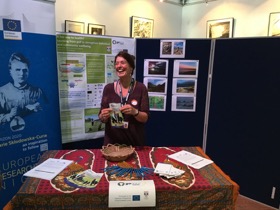 Explorathon is an EU funded initiative supporting public engagement with research at several Scottish Universities. Over 1700 people chose to explore the research underway at the University of St Andrews on 29th September. There were interactive games, displays and plenty of questions to discuss. The Byre Theatre buzzed as visitors young and old moved through the stalls and attended events. One of the stalls showcased the research from GoGolf. This EU Erasmus+ co-funded programme is examining what the contributions of golf and of sport more widely might be to health and wellbeing, and exploring how we might increase access to and participation in golf for young people, in five European countries. These questions help us support the golf sector to address social sustainability challenges. Rehema White demonstrated how we design research tools to tackle our research objectives, and visitors had the chance to consider their attitudes to golf. One young boy said that he liked to play golf because it was calming. Other people talked about cultural differences in perceptions of golf. The stall also exhibited beautiful pictures of natural environments in Scotland, and a sample survey was available allowing people to test one way of measuring their degree of nature connection. We discussed how doing physical activity outdoors can add benefit, and children offered opinions on which natural environments they prefer. Several youngsters said that being at the seaside was more fun than being in the woods or on the mountains, because they could play in the sand and swim!
Explorathon is an EU funded initiative supporting public engagement with research at several Scottish Universities. Over 1700 people chose to explore the research underway at the University of St Andrews on 29th September. There were interactive games, displays and plenty of questions to discuss. The Byre Theatre buzzed as visitors young and old moved through the stalls and attended events. One of the stalls showcased the research from GoGolf. This EU Erasmus+ co-funded programme is examining what the contributions of golf and of sport more widely might be to health and wellbeing, and exploring how we might increase access to and participation in golf for young people, in five European countries. These questions help us support the golf sector to address social sustainability challenges. Rehema White demonstrated how we design research tools to tackle our research objectives, and visitors had the chance to consider their attitudes to golf. One young boy said that he liked to play golf because it was calming. Other people talked about cultural differences in perceptions of golf. The stall also exhibited beautiful pictures of natural environments in Scotland, and a sample survey was available allowing people to test one way of measuring their degree of nature connection. We discussed how doing physical activity outdoors can add benefit, and children offered opinions on which natural environments they prefer. Several youngsters said that being at the seaside was more fun than being in the woods or on the mountains, because they could play in the sand and swim!
Guest lecture from Prof Audrey Kobayashi
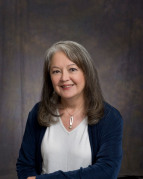 The GOSSIP research group were thrilled to welcome Professor Audrey Kobayashi from Queens University, Canada to deliver a lecture to the school and the wider university community.
The GOSSIP research group were thrilled to welcome Professor Audrey Kobayashi from Queens University, Canada to deliver a lecture to the school and the wider university community.
For those who might not be familiar with her work, Professor Kobayashi works on a wide range of topics and is recognised for her writing on gender, race, culture and community. She also does work with community groups, government organisations, and other stakeholders. Her work speaks across disciplines, so I am anticipating a great talk that will be of interest to many of us.
Health Volunteering research is well received at recent event
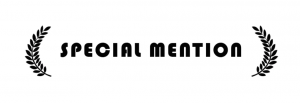
This event, ‘Towards Global Citizenship’ held at the RCPSG in September, featured clinicians, health policy-makers and global health experts talking about international health volunteering in the UK and Scottish context. Benet’s poster ‘Examining the social geographies of international health volunteering’ received keen interest from delegates, a special mention and generous round of applause in the plenary session. Benet had a great day making contacts and raising awareness of what social science can add to understandings in this highly topical area.
Congratulations Esther!
The SGSD’s Writer in Residence Esther Rutter has won the 2017 Roger Deakin Award. Awarded by The Society of Authors/Authors Foundation, the award assists writers with research costs for works in progress. Previous winners include Lucy Jones (Foxes Unearthed), Helen Scales (Spirals in Time), Caspar Henderson (The Book of Barely Imagined Beings), and Rob Cowen (Skimming Stones and Other Ways of Being in the Wild). The award was set up in memory of nature writer Roger Deakin (1943 – 2006), author of Wildwood, Notes from Walnut Tree Farm, and Waterlog and co-founder of Common Ground.
Creating a splash in Ullapool
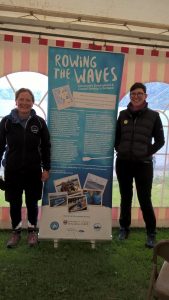 Ullapool is located on the North West coast of Scotland, sandwiched between mountains (Bheinn Ghobblach to the west, An Teallach to the south west) and the Atlantic. The hub of the town sits on the edge of a sea loch, behind the ferry port, from which the Caledonian MacBrayne does the return trip to Stornoway each day.
Ullapool is located on the North West coast of Scotland, sandwiched between mountains (Bheinn Ghobblach to the west, An Teallach to the south west) and the Atlantic. The hub of the town sits on the edge of a sea loch, behind the ferry port, from which the Caledonian MacBrayne does the return trip to Stornoway each day.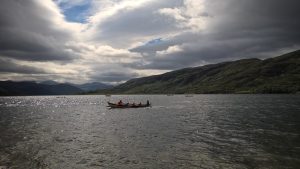
On the 8th and 9th of July 2017, Ullapool Coastal Rowing Club (CRC) hosted its annual Scottish Coastal Rowing Regatta. 23 Scottish Rowing Clubs took part, including St Andrews CRC. Nina Laurie and Jen Remnant, both GOSSIP researchers, took on dual roles as part of the event – both rowers for St Andrews CRC and researchers as part of the ‘Rowing the Waves’ project.
The project is exploring the scope and impact of Scottish Coastal Rowing on coastal communities, using a mixed method approach. In addition to interviews, focus groups and surveys, the project features ethnographic methods, which were employed in the fieldwork in Ullapool. Furthermore presence at the regatta meant that the researchers were able to engage with a larger number of Scottish Coastal Rowers, and introduce them to the project, as well as catch up with project partners and participants
Crafting the future! Knitting solutions in UN conference on learning for sustainability.
GOSSIP members Esther Rutter and Rehem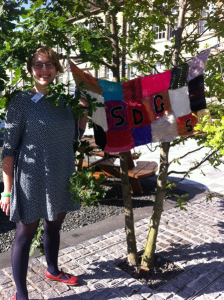 a White facilitated craftivism at a UN conference on learning for sustainability in Edinburgh last week! Participants knitted squares using left over wool remnants during a workshop on values and talks on sustainability action. One participant even crocheted a square using a pen. Squares were sewed together to create a matrix symbolising the UN Sustainable Development Goals. This piece of crafted work was hung in a tree to raise awareness of the work of the conference and to signify the needs to work in partnership and to acknowledge different actors and skills in our pursuit of sustainable development.
a White facilitated craftivism at a UN conference on learning for sustainability in Edinburgh last week! Participants knitted squares using left over wool remnants during a workshop on values and talks on sustainability action. One participant even crocheted a square using a pen. Squares were sewed together to create a matrix symbolising the UN Sustainable Development Goals. This piece of crafted work was hung in a tree to raise awareness of the work of the conference and to signify the needs to work in partnership and to acknowledge different actors and skills in our pursuit of sustainable development.
Learning underpins the capacity of people to fulfil their potential, to be active members of flourishing communities and to encourage organisations to pursue sustainable pathways. Our network organisation, Learning for Sustainability Scotland (LfS Scotland), is Scotland’s United Nations Regional Centre of Expertise in Education for Sustainable Development (UN RCE ESD). These organisations are each based at a university, but influence all forms of learning for sustainability across their regions: formal, including schools, universities and colleges; informal, including communities and institutions; and informal, including wider cultural and media influences. There is now an international network of over 150 UN RCEs.
Last week LfS Scotland hosted the UK annual conference of UN RCEs.
The crafted piece will be taken to the European UN RCE conference in September, representing the inputs and aspirations of UK participants, and then will be displayed at the Global UN RCE conference.
Esther Rutter, Writer in Residence wins book deal
In January 2017 Fife-based writer Esther Rutter decided to quit her day job to write and knit her way round the British Isles, combining locally-produced wool and historic knitting patterns to explore UK’s long love affair with wool.
After entering writer development agency’s XpoNorth’s Tweet Your Pitch competition on 6 January 2017 with her idea for This Golden Fleece, Esther attracted the attention of Edinburgh literary agent Jenny Brown. There was a flurry of interest in the book at the London Book Fair, and, after a two-way auction, world rights in the book were won by Bella Lacey, Editorial Director of Granta Books in April. This Golden Fleece is due to be published by Granta Books in Autumn 2019.
Esther Rutter commented: “Tweet Your Pitch is a fantastic initiative, enabling new non-fiction writers like me to grab the attention of publishers and agents with a dash of chutzpah and a good idea. Thank you to Jenny Brown, XpoNorth and the University of St Andrews for making my long-held dream of becoming a writer into a reality.”
Bella Lacey of Granta said: “I’ve been captivated by Esther Rutter’s absorbing history of wool and her intimate, inspiring mediation of the craft and history of knitting. She’s an instinctive storyteller, with a brilliant eye for detail, and brings startling new, and forgotten, histories to the surface. I’m thrilled to be welcoming her to the Granta list.”
Esther lives in Ceres and has just been awarded a Writer in Residence position at St Andrews University within the School of Geography and Sustainable Development. You can follow her journey on Instagram@thisgoldenfleece or Twitter @thisgoldfleece.
New Data Club starts
Our first get together took place in beautiful sunshine on Tues afternoon (8th May). The fortnightly meeting will bring together PGR/ECRs to get together and go through qualitative data. One person brings a transcript and we work through it as a group, eat cake and talk about qual data more generally. There is no expectation that attendees would come to the group every time it ran, though there is the expectation that people wouldn’t only come when bringing their own data.
Photos from our recent Away Day
Our first ever GOSSIP Away Day took place on Wednesday 3rd May at the St Andrews Botanical Gardens.
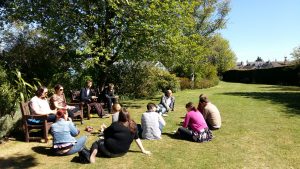
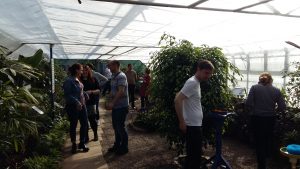

New research centre to inform housing policy in the UK
The University of St Andrews is a key partner in a new UK Collaborative Centre for Housing Evidence (CaCHE) which was announced on Friday 7th April.
The Centre will launch on 1August 2017 for five years and will receive £6 million of funding from the Economic and Social Research Council (ESRC), with support from the Joseph Rowntree Foundation and the Arts and Humanities Research Council (AHRC). A further £1.5m of funding will come from the consortium itself.
Dr Kim McKee, Director of the Centre for Housing Research, at St Andrews and Senior Lecturer in the School of Geography and Sustainable Development, is a key partner in the centre. She brings expertise in housing inequalities, drawing on her recent research on ‘generation rent’ which highlights an emerging housing aspirations gap.
Louise Reid hosts Fife Schools Event – 15th March.
On 15th March we welcomed 160 Higher Geography Pupils (& their teachers) from across the 18 Fife Secondary Schools for a mini-conference on geography. Led by GOSSIP member Dr Louise Reid, we talked with the pupils about a wide range of topics from housing (Dr Reid) and population change (Dr McCollum) to glaciology (Dr Sevestre), malaria (Dr Cox-Singh) and geomorphology (Dr Cowton), demonstrating the breadth of the subject and the potential opportunities for future study in the discipline. The aims of the event were to give pupils a taste of cutting-edge research in geography to supplement what they learn in class, and to enthuse them about future careers/studies in geography. The event was organised in combination with Claire MacLeod, principal teacher of Geography at Levenmouth Academy in Buckhaven, who is Fife representative of the Scottish Association of Geography Teachers.
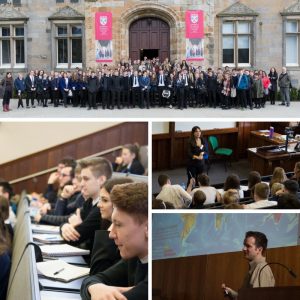
Health Volunteering in Scotland – 9th March
Benet Reid gave a presentation at the March meeting of Scottish NHS Volunteer Managers, about a plan for collaborative research on health volunteering in Scotland. His ideas were well-received, raising some exciting possibilities for collaborations in the near future, and beyond.

A Question of Sport – 8th March
Jen Remnant is on the ‘editorial collective’ of a BSA (British Sociological Association) funded blog. Her latest contribution is about rowing and can be found here: http://www.cost-ofliving.net/a-question-of-sport/
